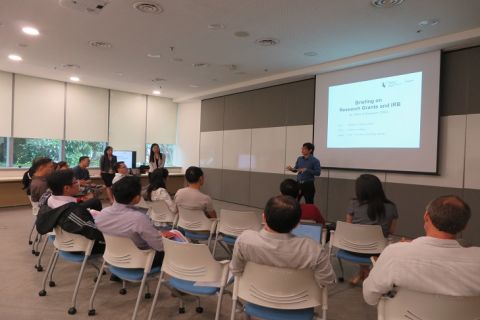
Research on financial reporting and disclosure examines issues at the heart of business, say Professors Cheng Qiang and Holly Yang from the SMU School of Accountancy.

By Dora Yip
SMU Office of Research – Since its establishment 14 years ago, the Singapore Management University (SMU) School of Accountancy (SoA) has made contributions to the tertiary and business landscape in Singapore and beyond. Apart from nurturing accounting practitioners who are capable of responding to an increasingly complex business environment, it has produced research that harnesses academia and industry insights.
The SoA Research (SOAR) Centre was established in 2010 to help SoA provide thought leadership in such areas as Corporate Governance, Auditing and Accounting Information; Financial Performance Analysis; Financial Intermediation and Information; Accounting Information System; and Corporate Reporting and Disclosure.
Guided by an advisory board of prominent accounting scholars, SOAR’s leadership team has steered the School to a ranking of 9th in financial archival research, according to Brigham Young University’s Accounting Research rankings in 2014.
Supporting healthy financial markets
The primary objective of accounting is to provide information to stakeholders, especially capital providers, so that they can make informed and effective decisions. Corporate reporting and disclosure play a central role in the proper functioning of capital markets because high quality financial reporting and disclosure help to mitigate information and agency problems, thus promoting more efficient capital allocation.
By focusing on research in this area, SoA aims to help academics, standard setters, corporate managers and the investment community achieve a better understanding of how corporate disclosure can contribute to the functioning of a more efficient capital market.
“Because companies use mandatory financial reporting and voluntary disclosure to provide corporate information, it is important to understand how they do so through these channels, and how capital markets react to such information,” says Cheng Qiang, SoA Associate Dean (Research) and Professor of Accounting.
In recent years, research on corporate reporting and disclosure has taken on greater urgency as a result of economic woes stemming from the US sub-prime mortgage crisis and faltering investor confidence due to the on-going European debt crisis.
“These financial crises highlighted the problem of investors not having enough information to understand the cash flow generated from an asset and the associated risks. When investors do not have enough information to separate good companies from the bad ones, they either stop trading or require higher returns to recoup their losses as a result of poor decisions. Both situations lead to inefficient capital allocation in society,” explains Professor Cheng.
Keeping up with technology and globalisation
Exacerbating the complexity of this challenge is the relentless pace of globalisation and technological change. Singapore, in particular, is affected by these trends, as there are many foreign firms listed on the Singapore Exchange, notes Professor Cheng. As the majority of their operations are based overseas, it is difficult for investors in Singapore to obtain information about these companies. As such, corporate disclosures are particularly important for these firms to reduce the information asymmetry between Singaporean investors and these firms’ managers, he explains.
With capital markets becoming increasingly integrated over time, the role of accurate and reliable financial reporting will only become more important. A significant development is the implementation of the International Accounting Standards (IAS) to regularise financial reporting for companies worldwide.
SoA Assistant Professor of Accounting Holly Yang, who studies voluntary disclosure and IAS, has collaborated with Professor Xi Li at Temple University to examine why firms around the world started providing more voluntary disclosures after the adoption of IAS.
“We found that greater voluntary disclosure was due to an increased demand for information from both financial analysts and foreign institutional investors,” she shares. “As the demand for corporate disclosure grows due to globalisation, it changes the way how companies communicate in order to meet the information needs of different stakeholders.”
She observes that academics are only just beginning to understand how online information will affect firms' disclosure policies in this digital age. The conventional thinking that more information is always better may no longer apply, and separating fundamental news from noise becomes imperative.
Trends in corporate reporting and disclosure research
Apart from grappling with globalisation and technological change, accounting research needs to consider emerging research into human psychology. Evidence in recent years has shown that human decisions can be influenced by the way information is presented. Such findings have deep implications for reporting and disclosure, notes Professor Yang.
Cultural differences also warrant further attention, she observes. Economic modelling commonly assumes that individuals are homogeneous, but the fact is we are not. “To the extent that we come from different backgrounds with different cultures, how we obtain, interpret and communicate information will be different. This affects not only how financial statements are prepared, but also how users react to any type of disclosure,” she explains.
Besides furthering the understanding of capital markets, accounting research can also shed light on behaviour within companies – an aspect that is critical to the success of accounting standards.
“We tend to focus on capital market consequences of new accounting standards because it tells us whether the accounting change is meaningful. But what is the effect of the reporting change on the firm internally? Do managers learn something new as well?” she asks.
According to Professor Cheng, other areas that call for more research to be done include: how much information should firms disclose, and the extent to which the credibility of such disclosed information is affected by the governance of the firm.
“A firm with better governance will be more transparent and the information it discloses will be regarded as more credible. It is important to study what governance mechanisms enhance financial reporting and disclosure, in terms of both quantity and quality,” he shares.
Both professors hope that the practical insights from their research will help foster a stronger profession and shape the future of global financial reporting.
“It is important for us to conduct high quality research at SMU in order to develop versatile accounting professionals and leaders. Research allows us to gain knowledge on current and important issues, whereas teaching allows us to disseminate this knowledge to students to stimulate creative, independent thinking,” says Professor Yang.
See More News
Want to see more of SMU Research?
Sign up for Research@SMU e-newslettter to know more about our research and research-related events!
If you would like to remove yourself from all our mailing list, please visit https://eservices.smu.edu.sg/internet/DNC/Default.aspx

